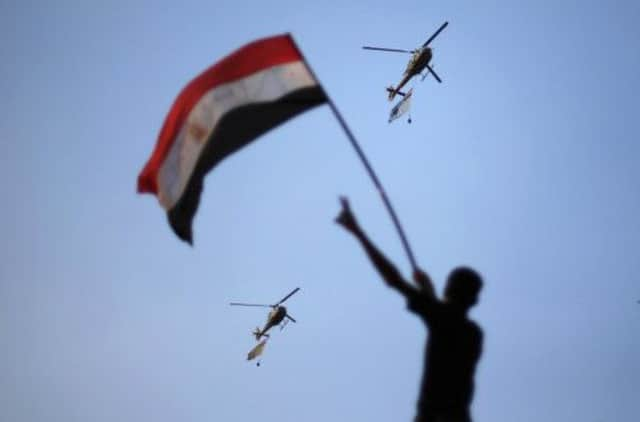Egypt: Compromise or we step in, military says


A dramatic statement from the country’s military, broadcast on state television yesterday, declared the nation was in danger after millions of Egyptians took to the streets on Sunday to demand that Mr Morsi quit. The headquarters of the ruling Muslim Brotherhood were also ransacked and damaged.
The military said the 48-hour ultimatum was a “last chance”.
Advertisement
Hide AdAdvertisement
Hide AdHowever, the army later released a statement saying the action did not amount to a “military coup” – but that it was “responding to the pulse of the Egyptian street” in order to force politicians to reach a consensus.
Mr Morsi’s backers were furious at the military statement. “The age of military coups is over,” said Yasser Hamza of the Muslim Brotherhood’s parliamentary wing.
But the news provoked delight among liberal leaders and crowds in Cairo’s Tahrir Square, who cheered when a flight of military helicopters swooped overhead trailing national flags – a powerful illustration of the military’s desire to be seen to be in tune with the people.
Chief-of-staff General Abdel Fattah al-Sisi said the people had expressed their will with unprecedented clarity in the mass demonstrations and wasting more time would only increase the danger of division and strife.
The army said it would oversee the implementation of the solution it sought “with the participation of all factions and national parties, including young people”, but it would not get directly involved in politics or government.
Anti-Morsi demonstrators outside the presidential palace cheered the army statement, and opposition National Salvation Front, which has demanded a unity government for months, applauded the military’s move.
On Tahrir Square, thousands were celebrating the move. Mohamed Ibrahim, 50, an accountant, said: “We want a new armed forces council to govern until new elections. The army alone supports the legitimate revolutionary will of the people.”
Amr Moussa, a liberal politician and former foreign minister who stood in last year’s presidential election, said: “The invitation to meet the demands of the people within the next few hours is a historic opportunity which should not be lost.”
Advertisement
Hide AdAdvertisement
Hide AdSince the fall of Hosni Mubarak more than two years ago as the Arab Spring revolutions took hold, the Arab world’s most populous nation has remained in turmoil, arousing concern amongst allies in the West and in Israel.
Analysts said the military intervention could serve Mr Morsi if he wished to compromise, but it risked giving his opponents an incentive to harden their demands, sensing support from the street and the generals, at the risk of triggering a coup.
“The ultimatum has the ring of a potential coup,” said Yasser al-Shimy of the International Crisis Group think-tank. “What makes it not a coup is it gives time for the politicians to sort out their differences.”
The second biggest Islamist group in parliament, the Nour Party, said it feared the return of army rule “in a big way”.
The armed forces have played an important role in Egyptian politics since army officers overthrew the monarchy in 1952.
After the destruction of its offices, the Brotherhood – which operated as an underground movement until the overthrow of Mubarak in 2011 – said it was considering how to defend itself.
Five non-Brotherhood government ministers resigned from the cabinet, apparently in sympathy with the protesters, underlining a sense of isolation for the party that won a series of elections last year.
Eight people died in a night of fighting on Sunday around the Brotherhood building, where guards fired on youths hurling rocks and fire bombs. A Brotherhood official said two of its members were hurt.
Advertisement
Hide AdAdvertisement
Hide AdAnother eight people were killed and 731 injured in clashes around the country on Sunday, the health ministry said.
The Brotherhood’s official spokesman said the attack had crossed a red line of violence and among possible responses might be to revive “self-defence committees” formed during the 2011 uprising. “The people will not sit silent,” Gehad El-Haddad said.